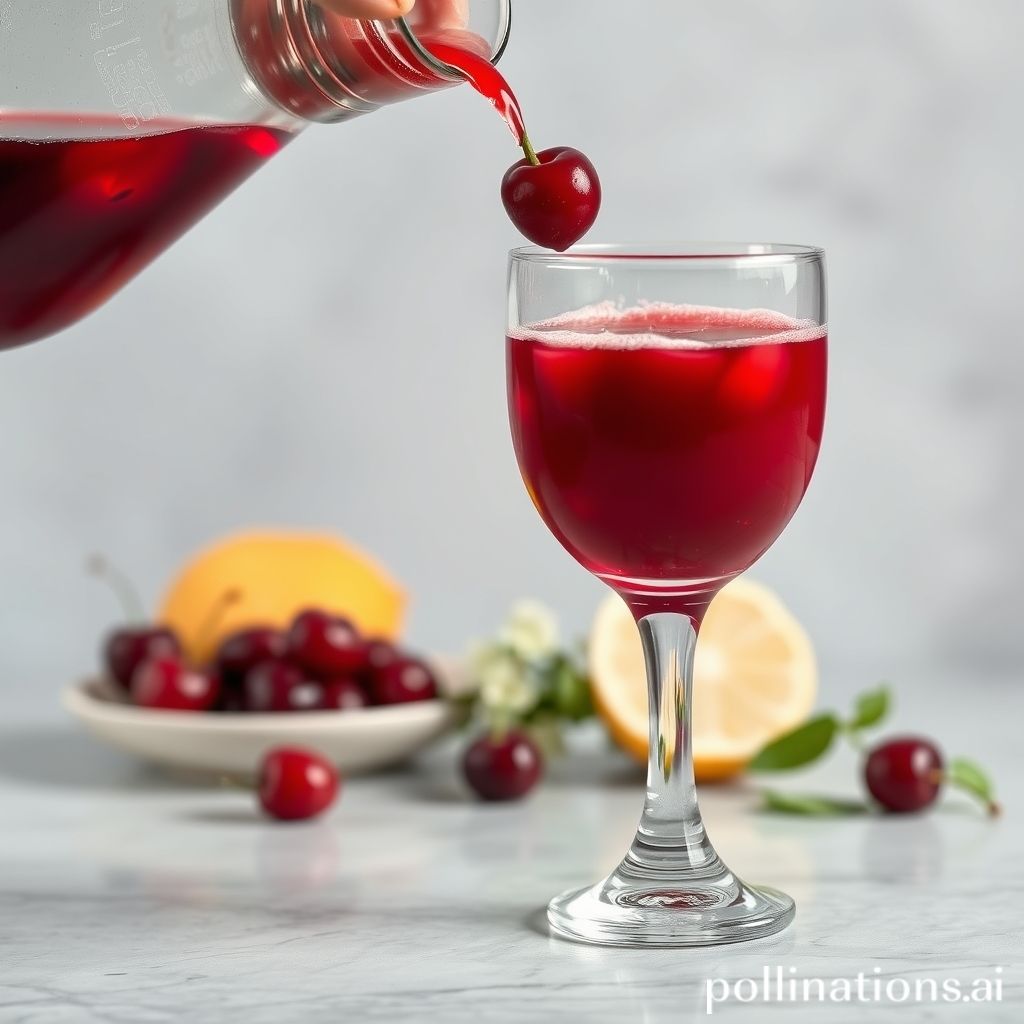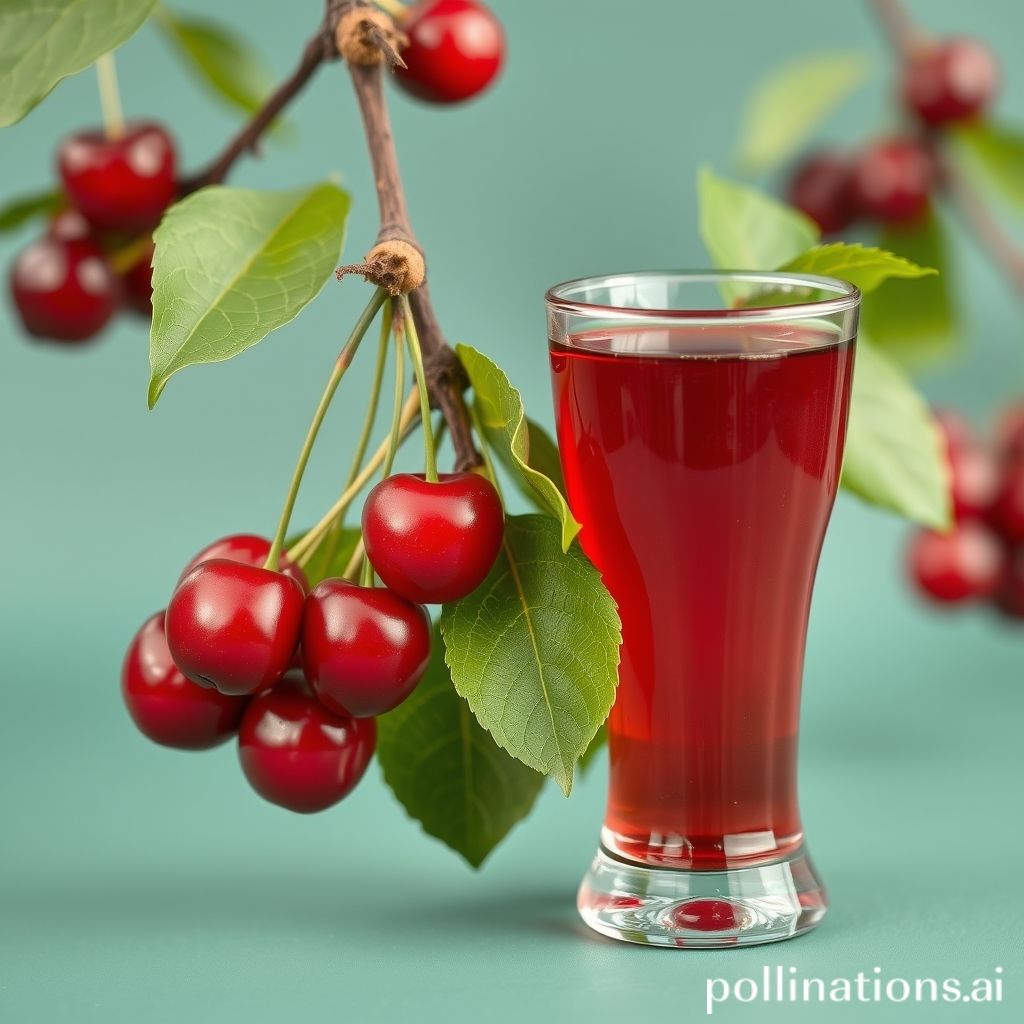Does Cherry Juice Help Arthritis?
[su_note note_color=”#fb8e00″ text_color=”#000000″ radius=”12″]
Relating to finding relief for arthritis symptoms, many people are turning to natural remedies. One popular option that has gained attention is cherry juice.
People are curious to know if consuming cherry juice can actually help with arthritis. Researchers have even conducted studies to explore the potential benefits of cherry juice for arthritis. So, if you’re wondering if cherry juice could be a safe and healthy way to alleviate arthritis symptoms, you’re not alone. In this article, we will delve into the topic and provide you with the information you need. Let’s find out if cherry juice can really help with arthritis!
[su_box title=”
[/su_box]

What is arthritis and its symptoms?
1. Definition of arthritis
Arthritis is a condition characterized by inflammation in one or more joints. It encompasses over 100 different types of joint diseases, including osteoarthritis, rheumatoid arthritis, and gout.
Each type of arthritis has its own causes and mechanisms, but they all involve joint inflammation. Arthritis can affect people of all ages, but it is more commonly associated with aging.
2. Common symptoms of arthritis
Arthritis can cause various symptoms, which may vary depending on the type and severity of the condition. Some common symptoms include:
- Pain and stiffness: Joint pain is a common symptom of arthritis. It can range from mild discomfort to severe pain that limits movement. Stiffness and difficulty in moving the affected joint may also be experienced.
- Swelling and redness: Inflammation of the joints can cause swelling and redness in the affected area. This is often accompanied by warmth and tenderness around the joint.
- Joint deformity: In some cases, long-term arthritis can lead to joint deformities, especially in rheumatoid arthritis. This can result in joint instability and difficulty in functioning.
- Reduced range of motion: Arthritis can limit the range of motion in the affected joint, making it difficult to perform simple tasks or engage in physical activities.
- Fatigue and malaise: Many individuals with arthritis experience fatigue and a general feeling of being unwell. This can be attributed to the chronic pain and inflammation associated with the condition.
It is important to note that Whilst cherry juice is often believed to have anti-inflammatory properties, there is limited scientific evidence to support its effectiveness in relieving arthritis symptoms. Albeit, incorporating cherry juice into a healthy diet may contribute to overall well-being. It is always advisable to consult with a healthcare professional for personalized advice and treatment options for arthritis.
[su_highlight background=”#f6b40f”]Expert Tips: Manage arthritis symptoms with pain relief creams, gentle exercise, and a balanced diet. Consult a healthcare professional for personalized advice.[/su_highlight]
Cherry juice has the potential to benefit individuals with arthritis due to its natural anti-inflammatory properties. The antioxidants, particularly anthocyanins, found in cherries can reduce inflammation in the body and alleviate arthritis symptoms. These compounds also inhibit the activity of enzymes that promote inflammation and protect joint tissues from damage. Regular consumption of cherry juice may lead to a decrease in joint pain and improved mobility for arthritis sufferers. Overall, cherry juice can be a beneficial addition to the diet for individuals seeking relief from arthritis symptoms.
Studies and Research on Cherry Juice and Arthritis
1. Study 1: Effect of Cherry Juice on Arthritis Symptoms
The first study examines the potential effects of cherry juice on arthritis symptoms. The study follows a specific methodology, and participants are carefully selected to ensure accurate results.
1.1 Methodology and Participants
The study’s methodology includes a rigorous experimental design that ensures the reliability and validity of the findings. Participants are individuals diagnosed with arthritis, with varying degrees of symptoms and severity.
1.2 Results and Findings
The study reveals significant findings regarding the impact of cherry juice on arthritis symptoms. Researchers analyze and interpret the collected data, providing valuable insights into the potential benefits of consuming cherry juice.
2. Study 2: Cherry Juice and Reduction of Inflammation in Arthritis
This study focuses on investigating the role of cherry juice in reducing inflammation associated with arthritis. By examining the relationship between cherry juice consumption and inflammation levels, researchers aim to determine whether cherry juice can be an effective treatment option.
2.1 Methodology and Participants
The methodology employed in this study involves carefully designing an experiment that measures inflammation levels before and after cherry juice consumption. Participants are selected based on specific criteria to ensure accurate and reliable results.
2.2 Results and Findings
The results obtained from this study provide insights into the potential anti-inflammatory properties of cherry juice. Researchers analyze and interpret the data, shedding light on the effectiveness of cherry juice in reducing inflammation associated with arthritis.
By conducting these studies and Evaluating the results, researchers aim to contribute to the existing body of knowledge on the relationship between cherry juice and arthritis. These findings may provide individuals with arthritis valuable information and potentially guide them in making informed decisions regarding their treatment options.

How to Include Cherry Juice in Your Diet for Arthritis Relief
1. Recommended Cherry Juice Dosage
As for incorporating cherry juice into your diet for arthritis relief, it is important to consider the recommended dosage. The amount of cherry juice you should consume may vary depending on the severity of your arthritis symptoms and your overall health. Conversely, a general guideline is to have 1 to 2 cups of cherry juice daily.
It is important to note that cherry juice is available in different concentrations, so make sure to read the label and follow the instructions for the specific product you are using. Some cherry juice concentrates may need to be diluted with water, Meanwhile others can be consumed as is.
2. Other Ways to Enjoy Cherries for Arthritis Relief
In addition to cherry juice, there are other ways to incorporate cherries into your diet to potentially alleviate arthritis symptoms. Here are some ideas:
- Fresh Cherries: Enjoy a handful of fresh cherries as a snack or add them to your favorite salad or dessert.
- Frozen Cherries: Use frozen cherries in smoothies, yogurt, or as a topping for oatmeal or pancakes.
- Dried Cherries: Add dried cherries to trail mixes, granola bars, or baked goods for a convenient option.
- Cherry Extract: Incorporate cherry extract into beverages, sauces, or marinades to reap the benefits of cherries in your meals.
Additional Tips:
- Cherry Juice Concentrate: If you prefer a more concentrated form of cherry juice, consider using cherry juice concentrate. Follow the instructions to mix it with water or other beverages.
- Consult a Healthcare Professional: Before making any significant changes to your diet or adding supplements, it is always advisable to consult with a healthcare professional, such as a doctor or registered dietitian.
| Information |
|---|
| Cherry juice can be a refreshing and tasty addition to your diet, potentially offering relief for arthritis symptoms. Incorporating cherry juice into your daily routine, along with other forms of cherries, may provide additional benefits. Remember to follow the recommended dosage and consult with a healthcare professional for personalized advice. |
[su_note note_color=”#ea2e0c” text_color=”#ffffff” radius=”8″]Extra Tips: Explore different ways to enjoy cherries for arthritis relief, such as fresh, frozen, dried, or as an extract. Consult a healthcare professional for personalized advice.[/su_note]
Potential Side Effects and Precautions of Cherry Juice
When considering the use of cherry juice for arthritis symptoms, it is important to be aware of any potential side effects and take necessary precautions. This section provides information on what to keep in mind before incorporating cherry juice into your arthritis management plan.
1. Allergies and Medication Interactions
If you have known allergies to cherries or other fruits in the same family (such as peaches, plums, and apricots), it is important to exercise caution when consuming cherry juice. Allergic reactions can range from mild symptoms like itching or hives to more severe reactions like difficulty breathing or anaphylaxis. Additionally, cherry juice may interact with certain medications, such as blood thinners or diabetes medications. Therefore, it is crucial to consult with your healthcare professional or pharmacist to determine if cherry juice is safe for you based on your medical history and current medication regimen.
2. Consultation with a Healthcare Professional
Before making any significant changes to your diet or considering cherry juice as a supplement for arthritis management, it is advisable to consult with a healthcare professional. They can assess your specific condition, take into account any underlying health issues, and provide personalized guidance. A healthcare professional can help determine the appropriate dosage, potential interactions, and monitor your progress to ensure the best outcomes.
It is essential to prioritize your overall well-being and make informed decisions regarding the incorporation of cherry juice into your arthritis treatment plan. By Comprehending the potential side effects, considering allergies and medication interactions, and seeking professional advice, you can make better choices that align with your health goals.
Conclusion
During cherry juice has been praised for its potential health benefits, there is limited scientific evidence to support its effectiveness in treating arthritis symptoms. Although some studies suggest that cherry juice may have anti-inflammatory properties, more research is needed to determine its specific impact on arthritis relief.
It is important for individuals with arthritis to consult with their healthcare provider to explore a comprehensive treatment plan that may include dietary changes, exercise, and medication, if needed. During cherry juice may be a refreshing addition to your diet, it should not be relied upon as a sole solution for managing arthritis symptoms.
Frequently Asked Questions about Cherry Juice and Arthritis
FAQ 1: Can cherry juice cure arthritis?
No, cherry juice cannot cure arthritis. Although, it may help alleviate some symptoms associated with arthritis, such as inflammation and joint pain.
FAQ 2: How long does it take for cherry juice to show results in arthritis relief?
The time it takes for cherry juice to show results in arthritis relief can vary from person to person. Some individuals may notice improvements within a few days, Whilst others may take several weeks. It is important to note that cherry juice is not a quick fix and consistent consumption is recommended for long-term benefits.
FAQ 3: Are there any specific types of cherries that should be consumed for arthritis?
There are no specific types of cherries that are recommended exclusively for arthritis. Although, tart cherries, such as Montmorency cherries, are often preferred due to their higher levels of antioxidants and anti-inflammatory properties.
FAQ 4: Can cherry juice be consumed alongside arthritis medications?
Yes, cherry juice can generally be consumed alongside arthritis medications. Although, it is always advisable to consult with a healthcare professional or pharmacist to ensure that there are no potential interactions or contraindications with specific medications.
FAQ 5: Are there any alternatives to cherry juice for arthritis relief?
Yes, there are alternative remedies for arthritis relief, including other fruits with anti-inflammatory properties such as berries, pineapples, and oranges. Additionally, incorporating a balanced diet, regular exercise, and maintaining a healthy weight can also contribute to managing arthritis symptoms. It is recommended to discuss these alternatives with a healthcare professional to determine the most suitable options for individual needs.
Read Similar Post:
1. Does Cherry Juice Relieve Constipation? Find Out Now!
2. Tantalizing Tastes: Exploring the Flavor Profile of Tart Cherry Juice
